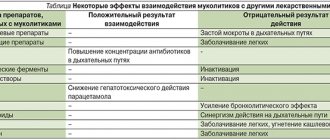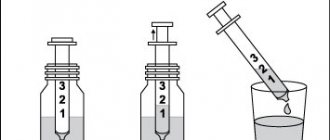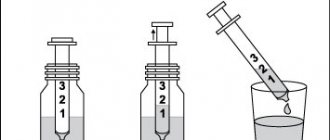Manufacturer: Vitaukt-prom LLC
Active ingredients
- Not indicated. See instructions
Pharmacological action
- Not indicated. See instructions
- Description of the pharmacological action of Urolite
- Composition Urolite
- Indications for use of the drug Urolit
- Release form of the drug Urolite
- Contraindications to the use of the drug Urolit
- Method of administration and dosage of the drug Urolit
- Storage conditions for the drug Urolit
- Shelf life of the drug Urolit
Description of pharmacological action
Have litholytic, antispasmodic, anti-inflammatory and analgesic effects Prevent the formation of sand and stones in the urinary system Promote the removal of urinary and gallstones Have disinfectant, antibacterial and diuretic effects Exhibit mild sedative properties, which are very important during the passage of stones Provide the removal of uric acid, urea, chlorides, which allows the drug to be used in the complex treatment of uric acid diathesis Promotes the outflow of bile
Action
Thick liquid from brown to reddish-brown color with a characteristic odor; The presence of opalescence, turbidity or precipitation is acceptable, which does not affect the quality and effect of this phytocomplex.
Component Properties
- They have litholytic, anti-inflammatory and analgesic effects.
- Prevents the formation of sand and stones in the urinary system.
- Promotes the removal of urinary and gallstones.
- They have a disinfectant, antibacterial and diuretic effect.
- They exhibit antispasmodic and sedative properties that facilitate the removal of stones.
- They ensure the removal of uric acid and urea, which allows the drug to be used in the complex treatment of uric acid diathesis.
- Promotes the flow of bile.
Madder tincture . Relaxes the muscles of the ureters and facilitates the passage of small stones. It has an antispasmodic and diuretic effect. Promotes the loosening of urinary stones containing calcium and magnesium phosphates, as well as the dissolution and removal of phosphates, oxalates and urates from the body. Madder is contraindicated in acute and chronic glomerulonephritis, peptic ulcer, hyperacid gastritis. The urine may turn reddish.
Wild carrots . It has a diuretic, choleretic, bactericidal and sedative effect. Due to the content of coumarins, the fruits of wild carrots have an antispasmodic effect on the coronary vessels, on the smooth muscle tissue of the gastrointestinal tract, bronchi and other internal organs. Preparations made from wild carrots are capable of dissolving mineral salts. Carrot infusion helps remove oxalates and phosphates from the body. Wild carrot seed extract is non-toxic and antimicrobial. Wild carrot preparations are used for urolithiasis and cholelithiasis, biliary dyskinesia, acute and subacute calculous pyelonephritis and cholecystitis.
Horsetail . It is used as a diuretic for diseases of the urinary tract (cystitis and urethritis), soothes pain due to urolithiasis, facilitates urination, and restores the colloidal structure of urine. Increases the proliferation of connective tissue, promoting its regeneration. Horsetail grass contains silicic acid salts, which promote the dissolution of stones and form protective colloids in the urine that prevent the crystallization of certain mineral components and thereby complicate stone formation. The hemostatic, antibacterial and anti-inflammatory effects of galenic forms prepared from the herb of the plant have also been established. Horsetail is contraindicated for glomerulonephritis.
Common goldenrod . Helps dissolve stones in the urinary tract. Shows a pronounced oxalatolytic and uratolytic effect. It has a hypoazotemic and diuretic effect.
Common fennel (dill) . Fennel fruits increase the secretion of the digestive glands, have a choleretic, oxalatolytic, antispasmodic and diuretic effect, have some antibacterial effect, increase the secretion of pancreatic juice and bile excretion. Normalize lipid metabolism. Prescribed for cholelithiasis and urolithiasis.
Common aspen . Promotes the removal of uric acid. Has anti-inflammatory, analgesic and antiseptic effects.
St. John's wort . Due to the content of flavonoids, it has an antispasmodic effect on the smooth muscles of the bile ducts, intestines, blood vessels and ureters. Increases the outflow of bile, prevents its stagnation in the gallbladder and thereby prevents the possibility of stone formation. Flavonoids also relieve spasms of the large and small intestines and restore normal peristalsis. They increase diuresis as a result of a direct increase in filtration in the renal glomeruli. In addition, St. John's wort preparations have an antimicrobial effect.
Knotweed (knotweed) . Increases diuresis, removes excess sodium and chloride ions in the urine, prevents the crystallization of salts, thereby preventing the formation of urinary stones. It has diuretic, antispasmodic, anti-inflammatory, antiseptic and analgesic properties. Exhibits oxalatolytic and phosphatolytic effects. Restores the colloidal structure of urine.
Melissa officinalis . It has a calming and antispasmodic effect, relieves tension in the smooth muscles of the intestine, normalizes heart function, stimulates lymph circulation and urination, improves digestion by promoting the secretion of gastric juice, and has an anti-inflammatory and bactericidal effect.
Eucalyptus twig . It has a pronounced antibacterial and anti-inflammatory effect. Eucalyptus preparations are active against gram-positive and gram-negative microorganisms and have a detrimental effect on fungi and protozoa.
Compound
Madder rhizomes and roots (Rhizomata et radix Rubiae tinctori) Wild carrot fruits (Fructus Dauci carotae) Horsetail herb (Herba Equiseti arvensis) Goldenrod herb (Herba Solidáginis virgáureae) Common fennel fruits (Fructus Foeniculi vulgaris Common aspen bark (Populi tremulae cortex ) St. John's wort herb (Herba Hyperici perforati) Knotweed herb (Herba Polygoni avicularis) Melissa officinalis leaves (Folia Melissae officinalis) Eucalyptus leaves (Folia Eucalypti viminalis) Auxiliary components: Sorbitol Potassium sorbate Citric acid Purified water
Indications for use
For the removal of stones, small stones and sand from the kidneys and gall bladder In combination with surgical treatment methods and lithotripsy - for the speedy removal of fragments of crushed stones For the prevention of relapses of stone formation In cases where surgical treatment methods are contraindicated Complex treatment of salt diathesis, acute and subacute calculous cholecystitis and pyelonephritis, biliary dyskinesia (as part of complex therapy). For the treatment and prevention of infectious and inflammatory processes that complicate the course of urolithiasis (cystitis, pyelonephritis)
UROLESAN. INSTRUCTIONS FOR USE. syrup
INSTRUCTIONS FOR USE
UROLESAN
UROLESAN
Trade name of the drug: Urolesan
Release form: Syrup. 90 ml in jars or bottles; 180 ml in bottles, included in a pack along with a dosing syringe.
Compound:
100 ml of syrup contains:
Active ingredients: fir oil – 0.419 g, peppermint oil – 0.105 g, wild carrot fruit extract liquid (1:1) – 1.204 g, hop cones extract liquid (1:1) – 1.726 g, oregano herb extract liquid (1: 1) – 1.195 g;
Excipients: polysorbate-80; citric acid, monohydrate; sorbic acid; sugar syrup; disodium edetate; purified water.
Description: The liquid is light yellow in color with a greenish tint, with a specific odor. Opalescence is allowed.
Pharmacotherapeutic group: drugs used in urology.
ATX code: G04B X.
Pharmacological properties
Combined preparation of plant origin. The components of the drug Urolesan reduce inflammation in the urinary tract and kidneys, promote increased blood supply to the kidneys and liver, have a diuretic, antibacterial, choleretic effect, form a protective colloid in the urine and normalize the tone of the smooth muscles of the upper urinary tract and gall bladder.
Urolesan increases the release of urea and chlorides, promotes the removal of small stones and sand from the bladder and kidneys.
Pharmacokinetics
The drug is well absorbed, its effect begins after 20-30 minutes and lasts 4-5 hours. The maximum effect occurs after 1-2 hours. It is excreted through the digestive tract and by the kidneys.
Indications for use
Acute and chronic infections of the urinary tract and kidneys (cystitis and pyelonephritis); urolithiasis and uric acid diathesis (prevention of the formation of stones after their removal); chronic cholecystitis (including calculous), biliary dyskinesia, cholelithiasis.
Directions for use and doses
The drug is taken orally before meals.
Recommended doses for adults: 1 teaspoon (5 ml) of syrup 3 times a day. For acute conditions (including renal and hepatic colic), the duration of the course of therapy is from 5 to 7 days, for chronic conditions - from 7 days to 1 month. If renal and hepatic colic occur, the single dose can be increased once to 2 teaspoons (10 ml), then at the next dose return to the usual single dose (5 ml).
Recommended doses for children: 1-2 years – 1-2 ml 3 times a day; 2-7 years – 2-4 ml 3 times a day; 7-14 years – 4-5 ml 3 times a day. Dosage is carried out using a dosing syringe.
Side effects
Urolesan is usually well tolerated. When using the drug the following are possible:
– from the digestive tract: dyspeptic symptoms (nausea, vomiting);
– allergic reactions: itching, facial redness, skin rash, angioedema (sore throat, difficulty breathing, swelling of the face, tongue);
– from the central and peripheral nervous system: dizziness, general weakness;
– from the cardiovascular system: arterial hypertension, hypotension.
Contraindications.
– Hypersensitivity to the components of the drug;
– gastritis, peptic ulcer of the stomach and duodenum.
Drug interactions
Not studied.
special instructions
Do not use the drug if the diameter of the stones exceeds 3 mm.
Patients with diabetes mellitus, as well as patients with high blood glucose levels, need to be careful when using Urolesan (the drug contains sugar syrup).
Use during pregnancy or breastfeeding. The use of the drug during pregnancy or lactation has not been studied.
The ability to influence the reaction rate when driving a vehicle or working with other mechanisms. No messages.
Children. The drug is not used in children under 1 year of age.
The drug should not be used after the expiration date and should be stored out of the reach of children.
Overdose
In case of overdose, possible: nausea, dizziness.
Treatment: plenty of warm drinks, rest, activated carbon, atropine sulfate (0.0005-0.001 g).
Storage conditions
In original packaging at temperatures from 8°C to 15°C. After opening, store for no more than 28 days at a temperature of 8°C to 15°C.
Best before date
2 years
Conditions for dispensing from pharmacies
Over the counter.
Manufacturer's name and address.
JSC "Galichfarm", Ukraine, 79024, Lvov, st. Opryshkovskaya, 6/8.
Best before date
18 months
Vitamins with similar effects
- Yoshi Vitamin Jelly Drink (vitamin complex) (Liquid for oral administration)
- Pantohematogen "Altamar™-4" (Oral tablets)
- Oculist blueberry (Oral tablets)
- Progaine, strawberry flavor (Powder for oral solution)
- Orthomol Vital F (granules) (Capsule)
- Goal T (Ointment for local and external use)
- Gripp-Heel (Aerosol)
Description of vitamin Urolite is intended for informational purposes only. Before starting to use any drug, it is recommended to consult a doctor and read the instructions for use. For more complete information, please refer to the manufacturer's instructions. Do not self-medicate; EUROLAB is not responsible for the consequences caused by the use of information posted on the portal. Any information on the project does not replace consultation with a specialist and cannot be a guarantee of the positive effect of the drug you use. The opinions of EUROLAB portal users may not coincide with the opinions of the site Administration.
Are you interested in vitamin Urolite? Do you want to know more detailed information or do you need a doctor's examination? Or do you need an inspection? You can make an appointment with a doctor - the Euro lab is always at your service! The best doctors will examine you, advise you, provide the necessary assistance and make a diagnosis. You can also call a doctor at home . Euro lab clinic is open for you around the clock.
Attention! The information presented in the vitamins and dietary supplements section is intended for informational purposes and should not be a basis for self-medication. Some of the drugs have a number of contraindications. Patients need to consult a specialist!
If you are interested in any other vitamins, vitamin-mineral complexes or dietary supplements, their descriptions and instructions for use, their analogues, information about the composition and form of release, indications for use and side effects, methods of use, dosages and contraindications, notes about the prescription of the drug for children, newborns and pregnant women, price and consumer reviews, or you have any other questions and suggestions - write to us, we will definitely try to help you.


